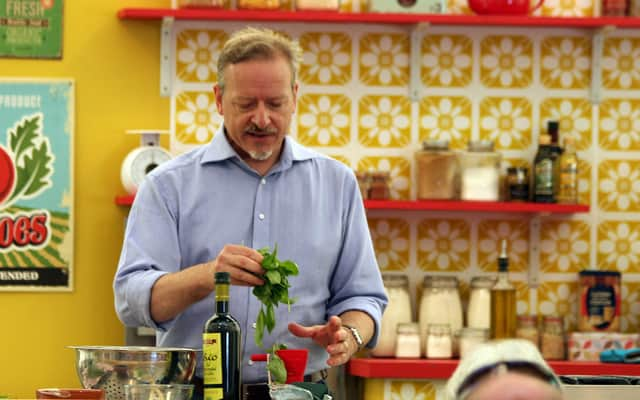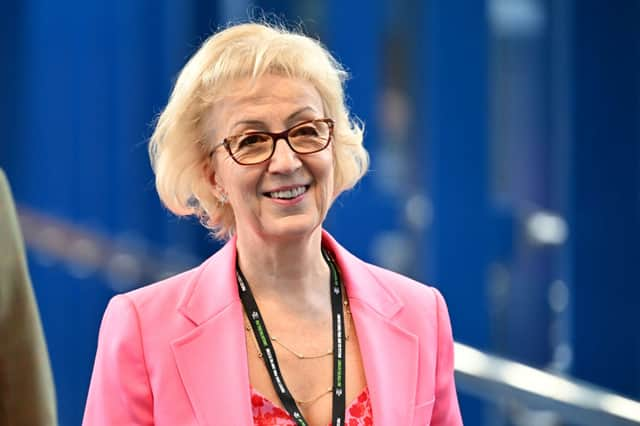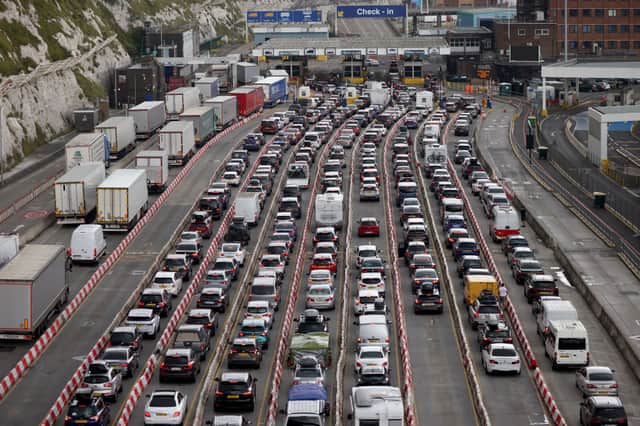Exclusive:Brexit: new border checks are ‘penalising small business’ with extra red tape
and live on Freeview channel 276
New post-Brexit import checks on food and plant products are “penalising small businesses”, companies have warned, amid concerns over biosecurity risks.
The first stage of the UK’s new border model, which has been delayed five times, finally launched, with additional physical checks and other requirements coming in throughout the next year. Today (31 January), a variety of imported animal and plant products will require EU health certification.
Advertisement
Hide AdAdvertisement
Hide AdHowever, small businesses have hit out at the government over the additional red tape and costs, despite the promise that Brexit would reduce bureaucracy. “One of the things that made me laugh the most is people who say the EU is bureaucratic,” Paolo Arrigo, managing director of Seeds of Italy, told NationalWorld. “It's not. The EU solved bureaucracy, it saved time.”
Arrigo imports the historic Italian Franchi seed brand to the UK, which has been in the same family for seven generations. He sells endangered, regional and heritage seed varieties to wholesalers, garden centres and the Royal Horticultural Society.


He told NationalWorld that importing had become much harder following Brexit, and that the new checks would add even more red tape. “I had one shipment early on with Brexit that was returned because it was written in blue ink and not black,” he said. “There's lots of inconsistencies, different interpretations of the same rules from different health inspectors, different hauliers, different shippers.”
Arrigo will now have to arrange a phytosanitary certificate and plant passport for each variety: “Have you ever applied for a passport? I have to do that every order … you can imagine how long that takes. All of these extra things, delays, cost money.”
Advertisement
Hide AdAdvertisement
Hide AdHe explained that the new import checks could put some seed companies out of business, saying they would have a disproportionate effect on SMEs (small and medium-sized enterprises). In April, the government is bringing in a charge as medium-risk products will undergo documentary, identity and physical checks at the border.
Arrigo is concerned that his orders of seed varieties from different artisan producers will be slapped with multiple fees. “Who's this penalising? Small business,” he said exasperatedly. “This is on top of all the other things we've got to do. There’s gonna be less choice, there's gonna be higher prices - this is not rocket science.”
Labour MP Stella Creasy raised the fact that the government has still not set the charge that importers will have to pay come April. “Can I just put on the record on behalf of British business - this is mad?” she told the Commons. “In 100 days’ time, there will allegedly be a charge, but nobody knows what that charge will be, so nobody can factor that into their costs.”
While Arrigo added: “We've got all these problems, which are worldwide problems plus, we've got Brexit - and it's making it worse. The people who still advocate it, well I'm gonna hold my tongue. They need to look at the facts and they need to speak to small businesses, and they need to see how it's affecting people on the ground.”
Advertisement
Hide AdAdvertisement
Hide AdConservative health minister and Brexiteer Andrea Leadsom said that having “some friction” when trading with the EU was the “price you pay” for “being a sovereign state again”. She told Times Radio: “There is a huge new opportunity for the UK at the same time as continuing to trade, albeit with some friction, which is the price you pay for leaving the single market and for being a sovereign state again.
“For me as a Brexiteer, I am still absolutely convinced that this is the right thing to do.” She added: “Leaving the single market was always going to have implications … I’m just saying that businesses need to adapt to meet the changing environment.”


On the eve of the arrangements coming into force, the Environment, Food and Rural Affairs Committee wrote to Steve Barclay, the Environment Secretary, to express unease about some of the preparations the government has made.
Goods from Britain have faced similar controls from the EU since it left the single market in 2021, but the UK has repeatedly put off checks in the other direction. Committee chairman Sir Robert Goodwill said he was concerned over plans that would see departmental funding for spot checks on products of animal origin at Dover reduced by around 70%.
Advertisement
Hide AdAdvertisement
Hide AdThe Tory MP said: “We remain concerned about the location of the physical checks that will be undertaken for commercial loads.” Under the new post-Brexit system, dubbed the Border Target Operating Model, health checks on foods arriving at Dover will be carried out at a facility in Sevington, Kent, about 22 miles inland. The Dover Port Authority has been among those expressing concern about the plan, as well as the prospect of funding cuts.


While Arrigo is worried about the impact that checks at the port, as opposed to their place of destination, will have on his industry. “That's going to be a nightmare for plants and seeds,” he said. “These are living things - they can't sit on hot lorries for hours and hours waiting for inspections.” Concerns have already been raised that Britons will go short on their Valentine’s Day roses from shortages over the new regime.
The Prime Minister’s official spokesman told NationalWorld: “We’ve been working very closely with businesses of all sizes to help prepare for the introduction of these changes, and that’s one of the reasons why it is phased.
“They are aimed to simplify the import process, using technology and data, digitised health certificates, to make it simpler for businesses to trade. That’s important because we need to protect the UK from malign importers and protect our food supply chains.”
Advertisement
Hide AdAdvertisement
Hide AdAccording to the phased timetable, by 30 April the relevant products will undergo documentary, identity, and physical checks, while imports of sanitary and phytosanitary goods from other parts of the world will adopt a new risk-based approach. From 31 October 2024, safety and security declarations for EU imports will become mandatory, along with a more streamlined dataset for imports.
Labour said the party, should it win this year’s expected general election, would look again at the trading relationship with Brussels if businesses are “struggling” with the new checks. Tulip Siddiq, a shadow Treasury minister, told Sky News: “If there are things that aren’t working, then of course we need to review it and look at it.
“We would look at where businesses are struggling, where the economy is struggling, and go and see if we can get a better deal for our country. That is what anyone who is in charge should be doing. They (voters) may have voted to leave the European Union, but they didn’t vote to get a bad deal.”
Ralph Blackburn is NationalWorld’s politics editor based in Westminster, where he gets special access to Parliament, MPs and government briefings. If you liked this article you can follow Ralph on X (Twitter) here and sign up to his free weekly newsletter Politics Uncovered, which brings you the latest analysis and gossip from Westminster every Sunday morning.
Comment Guidelines
National World encourages reader discussion on our stories. User feedback, insights and back-and-forth exchanges add a rich layer of context to reporting. Please review our Community Guidelines before commenting.
